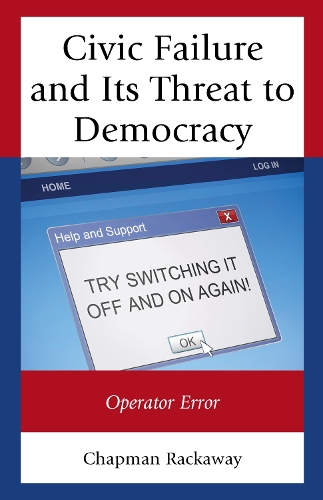
Civic Failure and Its Threat to Democracy: Operator Error
(Hardback)
Publishing Details
Civic Failure and Its Threat to Democracy: Operator Error
By (Author) Chapman Rackaway
Bloomsbury Publishing PLC
Lexington Books
14th December 2016
United States
Classifications
Professional and Scholarly
Non Fiction
Constitution: government and the state
Political science and theory
324.60973
Physical Properties
Hardback
218
Width 159mm, Height 240mm, Spine 20mm
458g
Description
The greatest threat to American democracy is the voting public. Candidates for political office, organized interests, and political parties are often blamed for the ills of American democracy, but this book places the focus on the core issue in American politics: a disengaged, demanding, and often contradictory voting public. Structural reforms such as the direct primary, term limits, and campaign finance regime reforms make the problems worse rather than better because these structural reforms fail to address core issues that disengage the voting public from republican politics.
Reviews
Chapman Rackaway has given us an important entry in a revitalized civic education literature.This book is a primer in civic failure, where voter apathy, ignorance, and the mismatch of citizen policy expectations with the mechanics of democracy have led to a mass abandonment of civic duty and the decline of citizenship as an ideal in the mass public. Serious students of civic education will appreciate the theoretical advancements and novel data and analysis, while policy makers at all levels of government would do well to take to heart the lessons on civic decline and the solutions proposed in Civic Failure.This is a must-read for anyone with an interest in the state of civics and the capacity for real change in American politics today. -- Donald M. Gooch, Stephen F. Austin State University
Rackaway stands the conventional wisdom on its head, arguing that reforms weakening political parties are the problem, not the solution to our democratic woes. With a broad historical sweep, he argues that parties link voters to policy choices in ways that no one else cannot the news media, not narrow interest groups, not direct democracy reforms such as the petition initiative. He advocates the abolition of the direct primary, the return of soft money, halving the size of Congressional districts, and experimenting with reforms like proportional representation that encourage the formation of strong third parties. -- Michael A. Smith, Emporia State University
In this incisive and nuanced work, Chapman Rackaway reminds us that Democracy is a two way street, that our politics reflect not just candidates, media and money but the most essential element, engaged citizens. His insights are invaluable. -- Kevin Anderson, Eastern Illinois University
Author Bio
Chapman Rackaway is professor of political science at Fort Hays State University.
